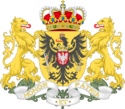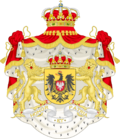Politics of Nikolia
 |
|---|
| This article is part of a series on the politics and government of Nikolia |
|
|
The politics of Nikolia take place in a framework of a federal parliamentary constitutional monarchy. The political system is laid out in 1925 Constitution which abolished the Empire, absolute monarchy, and democratised the country by establishing a clear separation of powers and limited power of the monarch. The executive branch is composed of the Monarch and the cabinet, known as the Crown Council, an executive governmental council, chaired by the Chancellor which is equal to a prime minister in other democracies. The bicameral parliament consists of an upper house, Council of Voivodeships with 150 representatives from 24 Voivodeships of Nikolia with proportional representation and a lower house, National Assembly of Nikolia with 650 MP's elected on a four year term by means of universal suffrage (18 years minimum age) in a system of constituency voting. The legal system of Nikolia follows principles of civil law codified in the most important code, the Civil Code of Nikolia. The judiciary system follows a hierarchy of courts, with Supreme Court of Cassation as the highest court in the system. The court of equal importance and status is the Constitutional Court of Nikolia, which is not directly part of the court hierarchy, as it deals with the questions of constitutionality.
History
Constitution
Executive branch
Federal Government
The executive power at national level is exercised by the Federal Government of Nikolia (Sirmian: Federalna vlada Nikolije; Mazurian: Rząd Federalny Nikolii) which consists of the Chancellor, proposed by the Monarch and appointed by the National Assembly, and its cabinet ministers.
The Chancellor and its cabinet are responsible for their actions before the Nikolian people through the National Assembly, which appoints and votes out the cabinet, including the Chancellor through a vote of no confidence.
Crown Council
The Crown Council (Sirmian: Krunski savet; Mazurian: Rada Korony) is a principal advisory body to the Federal Government, and to an extent, the Nikolian monarch. It composes of a number of permanent and elective members from different spheres of the society, who have been distinguished in their professions and have at least 15 years of experience in their field. Chairman of the Crown Council, is by convention, one of the cabinet ministers of the Federal Government, usually Vice-Chancellor, while the Nikolian monarch, or its representative may attend meetings of the Crown Council in which case, they are considered a chairman.
Functions of the Crown Council are to overlook the work of the Federal Government and its accordance with the Constitution and other laws of Nikolia. The Crown Council has powers to propose laws to the National Assembly and may also provide assessment of law proposals in parliamentary procedures. Thanks to its advisory role in the Nikolian Constitution, the Crown Council may provide the Federal Government with Advisory Instrument of the Crown Council commonly known as Advisory Instrument, a non-abiding document which provides commentary of the governmental policies and official proposal in what direction should governmental policies change.
Legislative branch

The legislature of Nikolia take place in a bicameral parliament consisiting of an upper house, Council of Voivodeships, with 150 representatives from 24 Voivodeships of Nikolia with proportional representation and a lower house, National Assembly of Nikolia with 650 MP's elected on a four year term by means of universal suffrage (18 years minimum age) in a system of constituency voting.
Council of Voivodeships
The main characteristic of the Nikolian federalism is that Voivodeships are directly involved in the legislative system on Kingdom level. That is achieved by Council of Voivodeships, an upper house of the Nikolian parliament. It consists of 150 delegates from 24 Voivodeships with proportional representation depending on the Voivodeship population. Delegates are appointed by their respective Voivodeship parliaments without fixed term of office, therefore composition of the Council varies depending on the election results in Voivodeship parliaments.
The Council of Voivodeships serves as a channel of communication between the Voivodeships and the Kingdom. Through the Council, Voivodeships participate in legislature and administration of the Kingdom, and shapes its political goals and foreign policy.
The basic tasks of the Council of Voivodeships are:
- Participate in legislative process
- Participates in solving administrative questions of the Kingdom
- Participates in decision making regarding political goals and foreign policy of the Kingdom
The Council of Voivodeships is headed by the President appointed from among the Voivodeship delegates for a 6 month term on a rotational basis. Secretary of the Council and its deputies are the only functions in the Council with a fixed 4 year term. Role of the Secretary is to communicate with the government and the National Assembly and inform the Council on future legislative initiatives.
National Assembly of Nikolia

The National Assembly of Nikolia (Sirmian: Narodna skupština, Mazurian: Zgromadzenie Narodowe) is the principal legislative body and the lower house of the Nikolian parliament. It consists of 650 members (singular Sirmian: Narodni poslanik, Mazurian: Członek zgromadzenia) elected on a 4 year term in a system of party-list proportional representation in a secret ballot. The electorate consistencies are third level administrative divisions - counties.
Elections
Judicial branch
